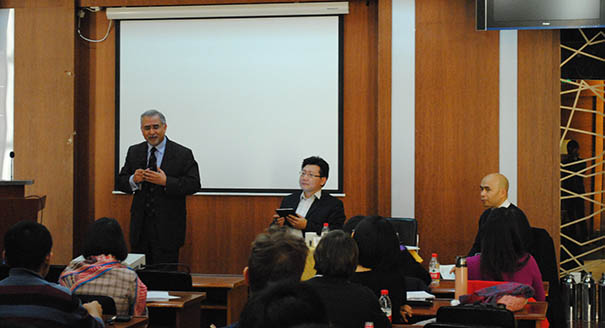Registration
You will receive an email confirming your registration.
Over 90 percent of Chinese trade is conducted through maritime shipping lanes, particularly in Southeast Asia. China has pledged generous support for infrastructure investment in the region through its Maritime Silk Road initiative. One such proposal, the Kra Isthmus canal in Thailand, has the potential to shorten shipping routes and substantially lower global crude oil prices. Such development projects, with support from the China-initiated Asian Infrastructure Investment Bank, are likely to feature heavily in the region’s ongoing growth.
Carnegie’s Vikram Nehru analyzed how Chinese economic interests and investment in the region are reshaping Southeast Asia. Zhao Kejin moderated a discussion between Nehru and Tang Xiaoyang, who served as a discussant.
Discussion Highlights
- Trade Openness and Economic Density: Panelists observed that many Southeast Asian countries have benefitted from their strategic location near the Strait of Malacca, a major conduit for global trade. They asserted that this proximity to vital shipping lanes has prompted the region to be open to trade and has fostered areas of dense economic activity, particularly along the coasts. This concentration of production lines and burgeoning trade numbers has fueled Southeast Asia’s economic success. One participant predicted that growing trade in services has great potential to sustain regional growth in coming decades.
- Constraints on Growth: Despite Southeast Asia’s favorable geographic position, panelists maintained that there are also challenges to regional growth. Financing has been a limiting factor, but China’s commitment to investing in the region is mitigating that issue. Participants noted that democratic governments like that of Indonesia must negotiate within private property law and also compensate former owners in order to acquire the land needed to build transportation infrastructure. Moreover, both domestic stakeholders and those in neighboring countries are concerned about specific projects that pose potential threats as well as offer potential benefits. One example is the proposed Myitsone Dam in Myanmar, which opponents warn could cause widespread flooding. All these factors, panelists stated, have constrained short-term economic growth, but they reasoned that addressing such externalities may produce more inclusive growth in the long term.
- China’s Investment in Southeast Asia: Panelists maintained that Chinese investment is instrumental to bolstering Southeast Asia’s economic growth. China is demonstrating increasingly assertive leadership in development financing through its support of the Asian Infrastructure Investment Bank and the BRICS Bank. Participants noted that Chinese President Xi Jinping’s Maritime Silk Road will also provide much-needed financing for transportation networks to strengthen regional trade networks. Given that trade between China and Southeast Asian countries is growing even more rapidly than trade within Southeast Asia, panelists concluded that economic ties between these hubs of economic growth will become even more important.
- Southeast Asia and Global Trade: Aside from intraregional commerce, panelists also discussed the region’s broader trade relations with the world. Participants acknowledged that Southeast Asian countries are influenced heavily by China, but noted that their leaders often seek to balance between engaging China and also cultivating ties with other economic actors, especially the United States and India. Globe-spanning initiatives such as the Trans-Pacific Partnership and the Regional Comprehensive Economic Partnership hold potential to greatly reduce trade barriers, but some experts fear that Washington and Beijing are pursuing competing agendas. Whether and when these agreements materialize, they may spur further growth, but regardless, panelists concluded that Southeast Asia’s burgeoning internal and external trade is a positive sign of regional open trade and deeper integration.
- Intraregional Links and Institutions: Panelists noted that regional exchanges are crucial to both development and stability in Southeast Asia. The region’s collective status as one of the world’s largest purchaser of military equipment belies the fact that no major military conflict has occurred there in decades. Despite overall peace, deep-seated distrust remains between Indonesia and Malaysia and between Thailand and Cambodia. Beijing’s territorial disputes in the South China Sea with Manila and Hanoi have also stoked tensions. Given these problems, participants concluded that regional venues like the ASEAN Regional Forum and Foreign Ministers’ Meeting are critical institutions for airing grievances and promoting diplomatic solutions.
Vikram Nehru
Vikram Nehru is a senior associate in the Carnegie Asia Program. An expert on development economics, growth, poverty reduction, debt sustainability, governance, and the performance and prospects of East Asia, his research focuses on the economic, political, and strategic issues confronting Asia, particularly Southeast Asia.
Zhao Kejin
Zhao Kejin is a resident scholar at the Carnegie–Tsinghua Center and deputy director of Tsinghua’s center for U.S.-China relations. An expert on U.S. government and politics, comparative politics, political marketing, and Chinese diplomatic institutions, Zhao runs a program on China’s public diplomacy. Zhao is also an associate professor in the Institute of International Studies at Tsinghua University.
Tang Xiaoyang
Tang Xiaoyang is a resident scholar at the Carnegie–Tsinghua Center for Global Policy and an assistant professor in the Department of International Relations at Tsinghua University. His research interests include political philosophy, China’s modernization process, and China’s engagement in Africa.
